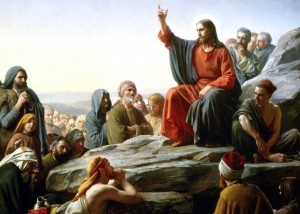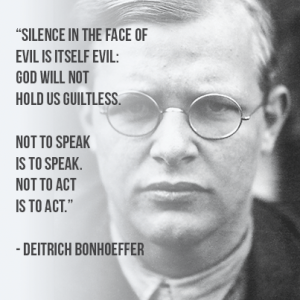Comfort Zone? Short Reflection on Two Beatitudes
 God forbid that postmodern pressures inhibit us from promoting what is godly in the culture, nor deter us from opposing what is impious. Yes, going against the flow is proving stressful. We live in tumultuous times, and some internal emotional turmoil (if not external persecution) will afflict any caring or sensitive Christian unwilling to remain passive.
God forbid that postmodern pressures inhibit us from promoting what is godly in the culture, nor deter us from opposing what is impious. Yes, going against the flow is proving stressful. We live in tumultuous times, and some internal emotional turmoil (if not external persecution) will afflict any caring or sensitive Christian unwilling to remain passive.
St. Thomas Aquinas takes this principle to the next level:
He who is not angry where he has cause to be, sins. For unreasonable patience is the hotbed of many vices; it fosters negligence, and incites not only the wicked but even the good to do wrong.[1]
The view that peace and tranquility should trump all else strikes me as more like Stoicism (or maybe Buddhism) than Christianity. Take The Beatitudes. In the Gospel (Matthew 5) Jesus tells us: “Blessed are those who mourn, for they will be comforted…. Blessed are those who hunger and thirst for righteousness, for they will be filled.”
To mourn the advance of evil, and to yearn for righteousness, can promote the common good. Without righteous indignation to check anti-social behavior, a police state will pick up the slack, as per Milton’s Paradise Lost:
Reason in man obscured, or not obeyed, immediately inordinate desires and upstart passions catch the government from reason, and to servitude reduce man till then free. Therefore since he permits within himself unworthy power to reign over free reason, God in judgment just subjects him from without to violent lords.[2]
To check the advance of political tyranny, a lot depends on social suasion by citizens. Notice that nothing in the Sermon on the Mount tells us to remain neutral. Jesus pats no one on the back who imagines himself unaffected by cultural depravity, or who feels indifference as regards public immorality. Indeed, God marks such a person for destruction according to Ezechiel 9:4-5!
In his classic, Democracy in America, Tocqueville identifies the essential part which social pressures must play in a democratic republic:
How is it possible for a society to avoid destruction unless moral restraint binds more tightly in proportion as political bonds are more relaxed?[3]
Any discerning American, any lover of liberty ought to be disconcerted by the things which dominate the daily news. If one is indifferent or nonchalant, how can he or she “claim the tribute of patriotism?”[4]
 A good citizen should, moreover, be ready to take action. Unless invincible ignorance prevents one from understanding how to be a good citizen, he or she is duty bound, under God, to promote the common good. “Knowing therefore what is good, and not doing it,” constitutes, according to Holy Scripture, sin.[5] Edmund Burke sees the same sin in a slightly different light. There is, he says, “a limit at which forbearance ceases to be a virtue.”[6]
A good citizen should, moreover, be ready to take action. Unless invincible ignorance prevents one from understanding how to be a good citizen, he or she is duty bound, under God, to promote the common good. “Knowing therefore what is good, and not doing it,” constitutes, according to Holy Scripture, sin.[5] Edmund Burke sees the same sin in a slightly different light. There is, he says, “a limit at which forbearance ceases to be a virtue.”[6]
NOTES
[1] Thomas Aquinas , Summa Theologica 158, quoting the attribution to St. John Chrysostom.
[2] John Milton, Paradise Lost, book XII, 1.87-93.
[3] Alexis de Tocqueville, Democracy in America 1:308.
[4] President George Washington’s Farewell Address, 1796: “Of all the dispositions and habits which lead to political prosperity, Religion and morality are indispensible supports.”
[5] Epistle of St. James 4:17 (Vulgate): “Scienti igitur bonum facere, et non facienti, peccatum est illi.”
[6] Edmund Burke, Observations on a Late Publication on the Present State of the Nation (1769) in Bartlett’s Familiar Quotations, 15th ed. (Boston: Little, Brown And Co., 1980), p. 372.

